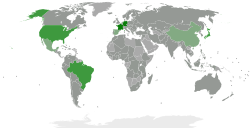Universal Esperanto Association
| Universala Esperanto-Asocio | |

Logo of UEA
|
|

Individual members by countries
1-150 members
151-300 members
301-451 members
|
|
| Abbreviation | UEA |
|---|---|
| Formation | 1908 |
| Founder | Hector Hodler |
| Purpose | promote the use of Esperanto |
| Headquarters | Central Office |
| Location |
|
| Coordinates | 51°54′50″N 4°27′52″E / 51.9138°N 4.4644°E |
|
Region
|
World |
|
Official language
|
Esperanto |
|
President
|
Mark Fettes |
|
Vice-President
|
Stefan MacGill |
|
General Director
|
Veronika Poór |
|
Key people
|
Ivo Lapenna |
|
Main organ
|
Central Committee |
| Affiliations | UN, Unesco |
| Website | uea |
The Universal Esperanto Association (UEA; Esperanto: Universala Esperanto-Asocio), also known as the World Esperanto Association, is the largest international organization of Esperanto speakers, with 5501 individual members in 121 countries and 9215 through national associations (in 2015) and in official relations with the United Nations and UNESCO. In addition to individual members, seventy national Esperanto organizations are affiliated with UEA. Its current president is the Canadian professor Mark Fettes. The magazine Esperanto is the main organ used by UEA to inform its members about everything happening in the Esperanto community.
UEA was founded in 1908 by the Swiss journalist Hector Hodler and others, and is now headquartered in Rotterdam, the Netherlands. The organization has an office at the United Nations building in New York City.
According to its 1980 statutes (Statuto de UEA), the Universal Esperanto Association has two kinds of members:
The highest organ of UEA, the Komitato, has members (komitatanoj) elected in three different ways:
The Komitato elects a board, the Estraro. The Estraro installs a general director and sometimes additionally a director. The general director and his staff work at the UEA headquarters, Oficejo de UEA, in Rotterdam.
An individual member can become a delegito, a 'delegate'. This means that he serves as a local contact person for Esperanto and UEA members in his town. A ĉefdelegito (chief delegate) is someone installed also by the UEA headquarters, but with the task to collect the member fees in a given country.
TEJO, the World Esperanto Youth Organization, is the youth section of the UEA. Similar to the World Congress, TEJO organizes an International Youth Congress of Esperanto (Internacia Junulara Kongreso) each year in a different location. The IJK is a week-long event of concerts, presentations, excursions attended by hundreds of young people from all over the world.
...
Wikipedia
